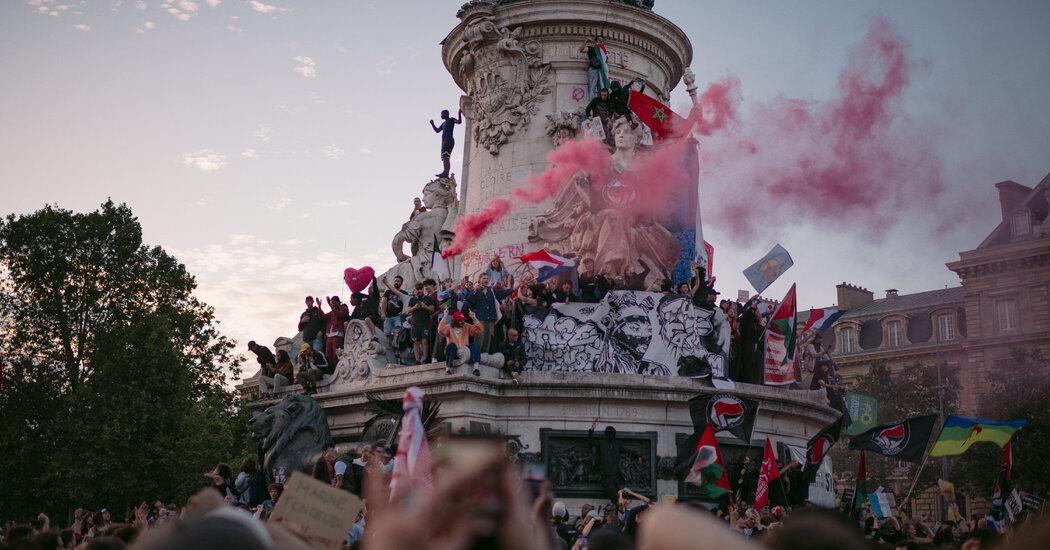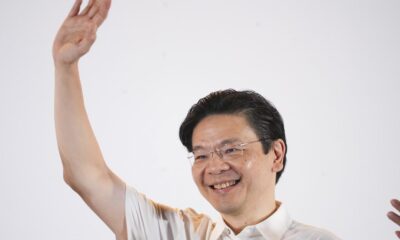Breaking News
French Election Yields Deadlock as Left Surges and Far Right Comes Up Short

France experienced a hung parliament and significant political uncertainty following snap legislative elections where the left, center, and right political groups emerged with substantial shares of the vote but no absolute majority.
Initial results defied expectations of a clear win for the National Rally, Marine Le Pen’s anti-immigrant party. Instead, the left-wing New Popular Front secured 178 seats.
President Emmanuel Macron’s centrist coalition came in second with 150 seats, while the National Rally and its allies obtained 142 seats.
The outcome, based on data from the Interior Ministry, confirmed that no single party or bloc would achieve a majority.
While the final results may change, it is evident that the strategy of centrists and the left forming a “Republican front” to combat the National Rally in the second round of voting was successful. Candidates withdrew from three-way races across France to unite against Le Pen’s party.
Jean-Luc Mélenchon, the far-left leader, called for the New Popular Front to govern, emphasizing readiness for the task.
However, the political landscape in France appeared challenging, especially with the Paris Olympics looming. The left made gains, the National Rally increased its presence in the National Assembly, and Macron’s party suffered a significant setback.
The divided Parliament presented difficulties in forming a governing coalition, with Macron’s centrists caught between opposing far-right and far-left factions.
Jordan Bardella, mentored by Le Pen, criticized the alliances that prevented the National Rally from securing an absolute majority, accusing Macron of plunging France into uncertainty.
Despite falling short of predictions, the National Rally’s influence in French politics has grown, challenging the postwar view that the far right should not hold power.
While Le Pen has distanced herself from past controversies, her party’s core message remains focused on immigration control and national identity.
France opted for change but rejected Le Pen’s vision, sending a clear message to Macron and the business elites.
Alain Duhamel, a prominent political scientist, remarked on the increased division in France, highlighting the repercussions of Macron’s decision to dissolve Parliament and call for elections.
The political uncertainty in France could impact the international scene, especially amid Biden’s challenges countering nationalist movements.
The New Popular Front’s platform focused on economic reforms and a supportive stance towards Ukraine, contrasting with the National Rally’s anti-immigration policies.
The economic feasibility of the Front’s proposals and the sensitive issue of immigration policy in France raised concerns.
The internal and external uncertainty in France may lead to a constitutional crisis, with challenges in forming a stable government.
Macron’s options include building a broad coalition or forming a caretaker government to address immediate issues.
His influence in international affairs may be affected by domestic weaknesses, impacting his stance on EU integration and support for Ukraine.
Russia anticipates France’s wavering position and seeks to exploit the situation for its benefit, emphasizing the need for a sovereign foreign policy.
The absence of a clear majority in France raises the prospect of a constitutional crisis and underscores the challenges in forming a stable government.
Unlike other European countries, France lacks a tradition of coalition governments, posing obstacles in the current political landscape.
Macron’s decision to call the elections may have unintended consequences, impacting the balance of power in French politics.
-

 Destination8 months ago
Destination8 months agoSingapore Airlines CEO set to join board of Air India, BA News, BA
-

 Breaking News10 months ago
Breaking News10 months agoCroatia to reintroduce compulsory military draft as regional tensions soar
-

 Tech News12 months ago
Tech News12 months agoBangladeshi police agents accused of selling citizens’ personal information on Telegram
-

 Gadgets3 months ago
Gadgets3 months agoSupernatural Season 16 Revival News, Cast, Plot and Release Date
-

 Productivity11 months ago
Productivity11 months agoHow Your Contact Center Can Become A Customer Engagement Center
-

 Gadgets3 weeks ago
Gadgets3 weeks agoFallout Season 2 Potential Release Date, Cast, Plot and News
-

 Breaking News10 months ago
Breaking News10 months agoBangladesh crisis: Refaat Ahmed sworn in as Bangladesh’s new chief justice
-

 Toys12 months ago
Toys12 months ago15 of the Best Trike & Tricycles Mums Recommend























